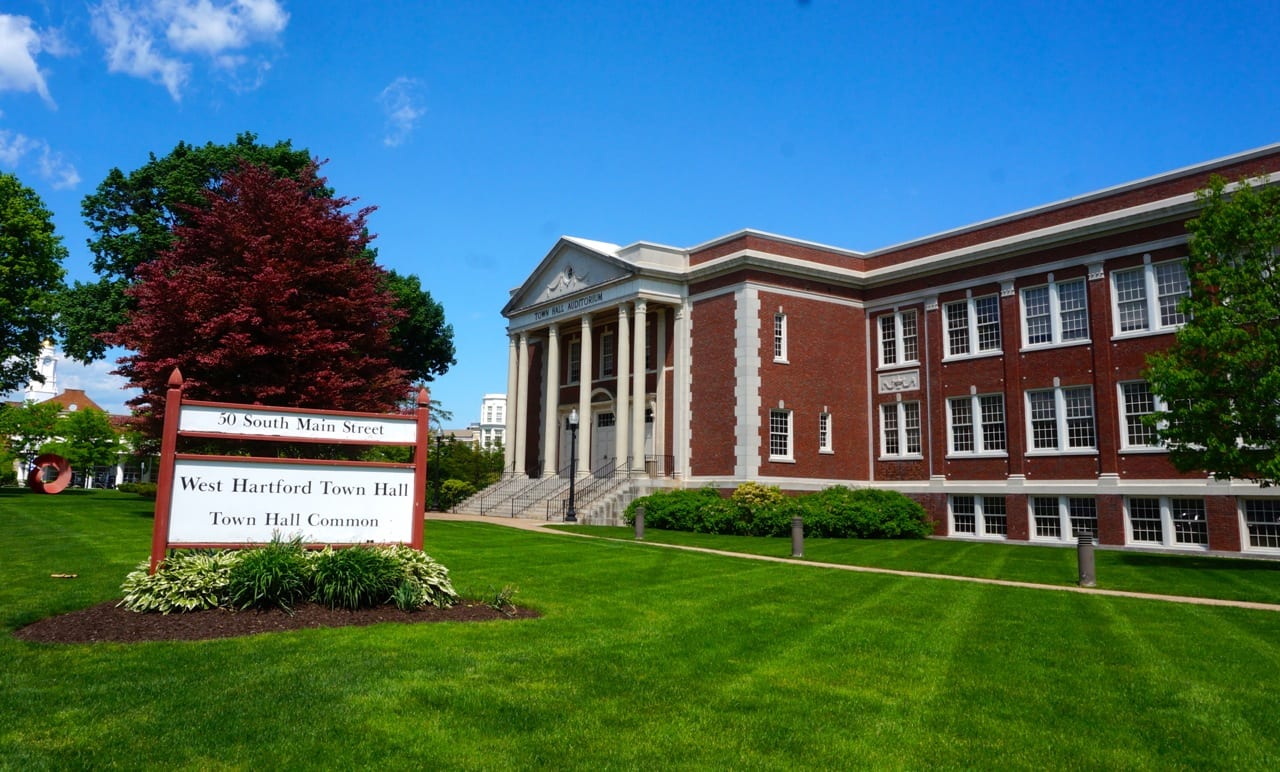Town Council to Discuss Resolution Asking State to Expand Voting Options

Audio By Carbonatix

West Hartford Town Hall. Photo credit: Ronni Newton
The West Hartford Town Council met Tuesday night, and voted 6-3 along party lines to forward a resolution asking the state to expand the use of absentee ballots to the Special Advisory Committee on Social and Community Recovery.
By Ronni Newton
Connecticut voters will be permitted to vote by absentee ballot for the August 11 primaries – an easing of the absentee ballot restrictions made possible by Executive Order 7QQ issued last week by Gov. Ned Lamont – but the expansion of mail-in voting does not extend to the November 2020 election or any future elections.
The Democrats on the West Hartford Town Council have introduced a non-binding resolution, which they would like to forward to the General Assembly, requesting the expansion of voting by mail for all future elections.
Following a 6-3 vote, with the three Republicans in opposition, the proposed resolution will be referred to the Council’s new Special Advisory Committee on Social and Community Recovery for further discussion and input from the public. The vote was not taken to discuss the merits of the resolution, but only to determine whether or not it would be referred to the Special Committee, which will meet on June 1 at 6 p.m.
The Special Advisory Committee itself not permitted to take action, but would be able to receive commentary from the public which the full Council, based on the standing rules under which it has been operating through virtual meetings amid the COVID-19 pandemic, is not able to do. The Special Advisory Committee could decide to forward the resolution back to the full Council for vote.
Mayor Shari Cantor, who introduced the resolution Tuesday, said that in Connecticut there is “currently no mechanism to obtain an absentee ballot due to fear of the pandemic.” The proposed resolution would not be binding, she noted, it “just urges action concerning the well being of the public.”
The resolution also asks for an additional appropriation to offset the increased costs associated with voting during a pandemic – which would be significant for in-person voting as well as for absentee ballot voting.
“We have all received correspondence from corporation counsel that it is inappropriate to discuss the merits” of the resolution, Republican Chris Williams said Tuesday. He said he opposes it “because it’s outside the purview” of the Town Council.
The Council had initially planned to vote on the resolution, rather than refer it to committee, and through social media, Williams had already expressed his opposition to a blanket expansion of absentee balloting other than due to the COVID-19 pandemic.
Republican Mary Fay, said this is a “state issue, not a West Hartford issue.” She said that every member of the Council should be weighing in on it if the resolution is to be considered.
“I think it’s important for the entire public to weigh in on this,” Minority Leader Lee Gold said, adding that it is important to conduct appropriate outreach.
The six Democrats who proposed the resolution itself said the referral to the Special Advisory Committee is the way to involve the public.
Councilor Ben Wenograd said the action was to allow for public comment.
Liam Sweeney, who chairs the Special Advisory Committee on Social and Community Recovery, said he had received emails requesting public input on the measure. He said he felt it was appropriate to refer it to the Special Advisory Committee – on which Fay and Democrat Carol Blanks also serve – because their purview includes elections and due to “the impact this will have on the elderly population.”
Deputy Mayor Leon Davidoff said he also supported the referral “in light of the fact that the Council structure has been [temporarily] suspended,” and “this is the only legislative way we have of getting public input.”
Lamont’s Executive Order 7QQ regarding the primary was made using his authority under the existing public health emergency, a declaration which runs through Sept. 9.
The state constitution currently permits the use of absentee ballots only due to “absence from the city or town of which they are inhabitants or because of sickness, or physical disability or because the tenets of their religion forbid secular activity.” Lamont’s executive order expands the definition of “because of sickness” to not pertain to personal illness but to also include “because of the sickness of COVID-19.”
The decision to expand absentee balloting rests with the General Assembly, which has adjourned this year’s session and has not yet announced details about meeting in special session. A permanent change to the state’s constitution to permit “no excuse” absentee balloting is a lengthy process that would ultimately require approval by popular vote, but the legislature can, as the governor has done for August, expand the definition of “sickness” as a reason to allow vote by absentee ballot.
The resolution proposed by West Hartford Democrats would state to the General Assembly that “there are many reasons other than illness or physical absence that may make it difficult for an elector to vote in person, including work schedules and childcare needs,” and note that absentee voting is a proven method of secure voting.
It also states that “government should do everything in its power to maximize participation in elections and improve voter access.” The COVID-19 pandemic has highlighted the need for the expansion of absentee balloting, the resolution states, which is permitted in roughly two-thirds of states.
The Connecticut Mirror reported last week that there is a largely partisan divide among Connecticut legislators about expansion of absentee balloting, with the debate involving ballot access vs. ballot security. Mail-in voting is opposed by President Donald J. Trump, although it is widely accepted in states led by Republican governors.
Lamont, who is 66, said last week that he supports asking the legislature to allow for the expansion of absentee balloting at least through the November presidential election and hopes it will be a bipartisan effort. “If we don’t have a vaccine available by then, you still don’t want 65-year-olds going out and having to vote. … You still don’t want people with pre-existing conditions to vote. I think it’s very important that they don’t give up their right to vote by only being able to wait in line at some polling booth.”
The agenda for the June 1 meeting of the Special Advisory Committee on Social and Community Recovery will be published in the next several days, and will include information on how the public will be able to call in to provide comment on the resolution as well as other items that will be discussed.
Also at Tuesday night’s Council meeting, a proposal by The Bridge Family Center to convert a property that it purchased at 1021-1023 Farmington Ave. to a Special Development District and amend the underlying multi-family residential zone to RO (residential-office) was approved unanimously. The Bridge plans to improve the existing structure, which is next door to its youth shelter and across the street from its administrative offices. The organization will relocate the counseling program that is currently operating at 1038 Farmington Ave. to the renovated building.
Appointments and resignations from boards and commissions are not typically matter of discussion, but Tuesday night Council members took the opportunity to comment on one in particular.
Denise Hall, who formerly served as minority leader of the Town Council, has resigned her role as a commissioner with Metropolitan District (MD) because she and her husband, Tom, have permanently relocated from West Hartford to the Connecticut shoreline.
Council members from both parties offered their thanks and praise to Hall for her contributions, both to the Council and as an MDC commissioner.
“You are an exemplary citizen, and if people took contributing to the community like you do .. you make the community a better place,” Cantor said. “I am grateful for your dedication, your commitment, your honesty,” she said, wishing Hall and her family “much happiness and good health.”
In his report, Town Manager Matt Hart noted that West Hartford Police had observed “relatively heavy foot traffic in the town center this weekend.” He said that police were called to respond to a few issues regarding improper social distancing or larger-than-permitted gatherings, including a 40-person party in a residential neighborhood.
The party dispersed in response to police request, Hart said, and the resident told police they were unaware of the five-person limit on social gatherings.
The fire department responded to 83 calls for service over the Memorial Day weekend, Hart said, of which 63 were medical. Nine of those involved respiratory illnesses and 11 were from elder care facilities, he said.
Cantor, who participated remotely in the governor’s news briefing earlier in the day, said she had walked around the Center on Friday night after eating dinner at Artisan.
She said that while the first small steps in reopening have gone well, she has been receiving reports of people walking around the Center without masks or face coverings, but noted that the chance of spread is reduced significantly when all parties have their faces covered.
“Please, please wear your face coverings to protect your neighbors, your loved ones …” Cantor said.
Like what you see here? Click here to subscribe to We-Ha’s newsletter so you’ll always be in the know about what’s happening in West Hartford! Click the blue button below to become a supporter of We-Ha.com and our efforts to continue producing quality journalism.



